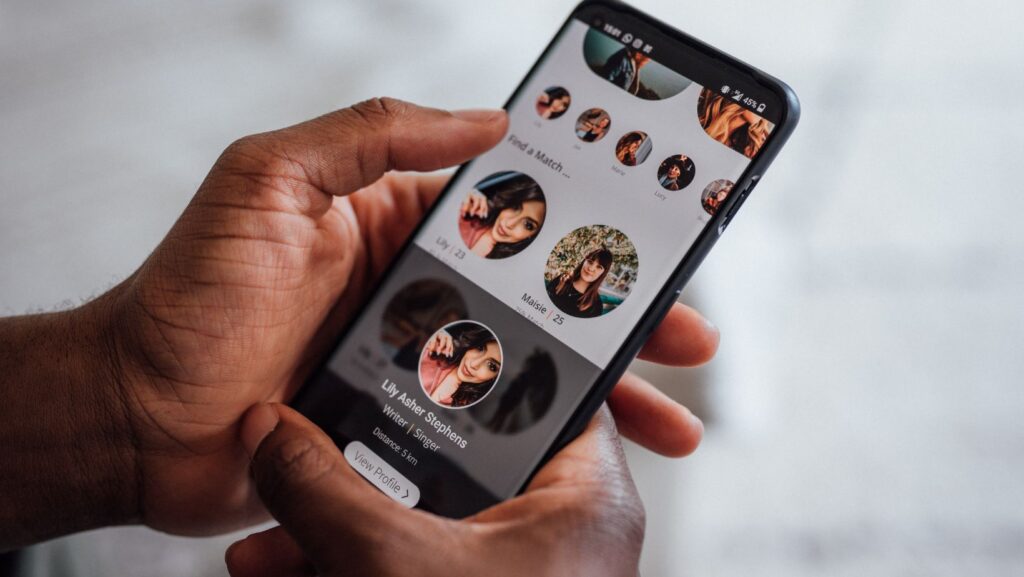The Visual Bias in Dating Apps
80% of men and 85% of women agree or strongly agree that photos are a dating app profile’s most critical aspect. Dating apps often prioritize users with high-quality, well-composed, or attractive profile pictures. Algorithms may rank profiles with clearer, higher-resolution images higher than those with blurry or low-quality photos. This is a good thing in itself, but the excessive focus on visual appeal has quite a few downsides. The main one is the frustration one feels from being bombarded with profiles on popular apps.
Dating apps may utilize AI to assess a photo’s composition, considering elements like lighting, symmetry, and overall “appeal” based on patterns learned from user preferences. More aesthetically pleasing or “balanced” photos might get a higher priority.
Some app algorithms even consider whether the clothing, background, or general style in a photo is trendy or corresponds to modern aesthetics, boosting profiles that align with current fashion or cultural preferences.
The algorithm monitors how often a profile gets liked or swiped right, which indirectly reflects the person’s attractiveness or aesthetic appeal. If a profile receives a lot of engagement, it may be ranked higher. In this way, personal preferences like not dating a man with kids can fall by the wayside.
Dating Profile Sins Ranked
Some apps may prioritize profiles that show a variety of images—such as photos from different angles, showing off hobbies, or pictures in various settings. However, one shouldn’t go overboard with angles. In fact, a recent survey of 1,000 daters revealed the top dating profile sin was posting photos from weird angles. 41.12% of those surveyed ranked this as their biggest pet peeve, followed by edited or filtered photographs (41.02%) and smoking or vaping pics (40.62%). 31% of dating app users hadn’t updated their pictures in over a year.
In an effort to attract more matches, 15% of men have borrowed a pet for a picture. Hiring a photographer is becoming more common as 49% of users believe it leads to more matches, more people messaging you first (43%), and more likes (48%).
Many users adjust their photos using filters, brightness adjustments, or other enhancements to render them more visually appealing. Profiles using such features may stand out more and receive higher engagement. However, 73% of users want apps to ban severe editing. 89% have had one or more dates with someone they met online who looked completely different in person.
The Psychological Impact of Aesthetic-Based Algorithms
The prioritization of looks over genuine compatibility affects self-esteem and dating expectations. Users may feel pressured to present an idealized version of themselves rather than a true representation. This can lead to increased anxiety and reduced satisfaction in dating experiences.

Additionally, studies suggest that people who match based on attraction alone often struggle with deeper relationship compatibility. If dating apps continue to emphasize aesthetic appeal over personality traits, users may experience a cycle of short-term relationships that lack emotional connection.
The Solution: Finding Genuine Compatibility
Many singletons are looking for serious relationships on dating apps, and serious relationships aren’t possible without genuine compatibility. The solution could be using apps with a highly thorough matching process, a large and active user base, and compatibility scores for every potential match. Paywalls aren’t necessarily a bad thing; the cost lowers the risk of dealing with a time waster who put up attractive pictures.
The app should vet all candidates to ensure they’re legitimate users. Ideally, humans should do this and not bots or AI. Some apps do not use algorithms that prioritize aesthetics. They enable hand-picked matches based on preset criteria, can filter out qualities the user is not interested in, and employ dating experts. They should provide access to users of many different sexual orientations and the option to choose monogamy or nonmonogamy.
How to Know You’re Genuinely Compatible with Someone
You’ll never know without meeting them in person. When that happens, you should enjoy their company and feel like you relate to them and that your values align in key areas. These might include financial management, whether you want to start a family, political views, religion, causes like environmental protection or animal rights, or anything else that’s important to you. If their values do not align with all of yours, they should at least be neutral.

One way to enhance compatibility is by using dating apps that offer detailed questionnaires or personality assessments to match users based on deeper aspects rather than just looks. Features such as video chats before meeting in person can also help build trust and prevent unpleasant surprises.
Final Thoughts: Prioritizing Substance Over Surface
Dating app algorithms, by favoring aesthetics over genuine compatibility, shape modern dating experiences in ways that aren’t always beneficial. While attraction is an essential part of romantic relationships, it should not be the sole determinant of a successful match. Users must remain aware of the role that algorithms play in shaping their dating experiences and take proactive steps to focus on genuine connection rather than just physical appeal. Choosing platforms that emphasize personality, lifestyle compatibility, and mutual values can lead to more meaningful relationships. By shifting the focus from appearance-driven swipes to authentic compatibility, users can cultivate relationships that are not just visually appealing but emotionally fulfilling. Ultimately, dating is about finding someone who resonates with your values and lifestyle. While high-quality pictures will always play a role, real connections go far beyond the pixels on a screen. So, instead of chasing the next right swipe, prioritize substance over surface and embrace connections that are built to last.
